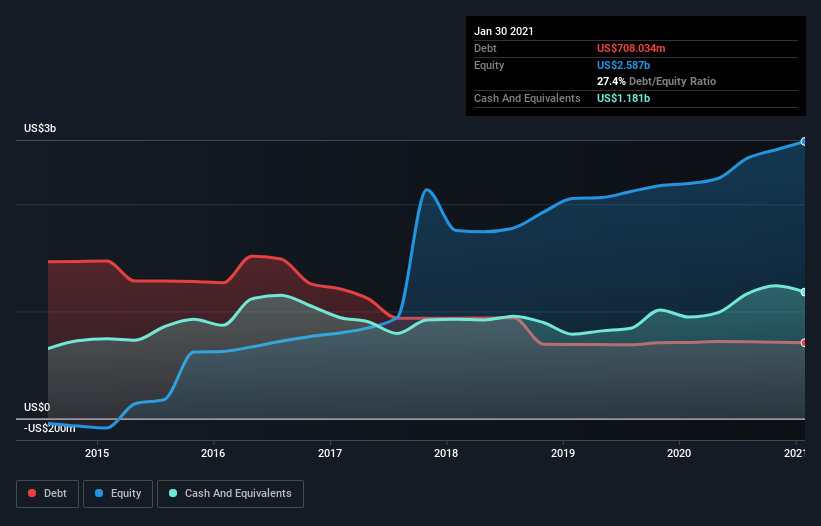Ciena (NYSE:CIEN) Has A Rock Solid Balance Sheet
The external fund manager backed by Berkshire Hathaway's Charlie Munger, Li Lu, makes no bones about it when he says 'The biggest investment risk is not the volatility of prices, but whether you will suffer a permanent loss of capital.' It's only natural to consider a company's balance sheet when you examine how risky it is, since debt is often involved when a business collapses. We note that Ciena Corporation (NYSE:CIEN) does have debt on its balance sheet. But should shareholders be worried about its use of debt?
What Risk Does Debt Bring?
Debt and other liabilities become risky for a business when it cannot easily fulfill those obligations, either with free cash flow or by raising capital at an attractive price. In the worst case scenario, a company can go bankrupt if it cannot pay its creditors. While that is not too common, we often do see indebted companies permanently diluting shareholders because lenders force them to raise capital at a distressed price. Of course, plenty of companies use debt to fund growth, without any negative consequences. When we examine debt levels, we first consider both cash and debt levels, together.
View our latest analysis for Ciena
What Is Ciena's Debt?
The chart below, which you can click on for greater detail, shows that Ciena had US$708.0m in debt in January 2021; about the same as the year before. However, it does have US$1.18b in cash offsetting this, leading to net cash of US$472.6m.
A Look At Ciena's Liabilities
Zooming in on the latest balance sheet data, we can see that Ciena had liabilities of US$684.8m due within 12 months and liabilities of US$915.6m due beyond that. Offsetting this, it had US$1.18b in cash and US$811.6m in receivables that were due within 12 months. So it can boast US$391.9m more liquid assets than total liabilities.
This surplus suggests that Ciena has a conservative balance sheet, and could probably eliminate its debt without much difficulty. Simply put, the fact that Ciena has more cash than debt is arguably a good indication that it can manage its debt safely.
Another good sign is that Ciena has been able to increase its EBIT by 26% in twelve months, making it easier to pay down debt. When analysing debt levels, the balance sheet is the obvious place to start. But ultimately the future profitability of the business will decide if Ciena can strengthen its balance sheet over time. So if you're focused on the future you can check out this free report showing analyst profit forecasts.
Finally, a business needs free cash flow to pay off debt; accounting profits just don't cut it. Ciena may have net cash on the balance sheet, but it is still interesting to look at how well the business converts its earnings before interest and tax (EBIT) to free cash flow, because that will influence both its need for, and its capacity to manage debt. Over the most recent three years, Ciena recorded free cash flow worth 74% of its EBIT, which is around normal, given free cash flow excludes interest and tax. This free cash flow puts the company in a good position to pay down debt, when appropriate.
Summing up
While it is always sensible to investigate a company's debt, in this case Ciena has US$472.6m in net cash and a decent-looking balance sheet. And it impressed us with its EBIT growth of 26% over the last year. So is Ciena's debt a risk? It doesn't seem so to us. When analysing debt levels, the balance sheet is the obvious place to start. However, not all investment risk resides within the balance sheet - far from it. For example - Ciena has 1 warning sign we think you should be aware of.
If you're interested in investing in businesses that can grow profits without the burden of debt, then check out this free list of growing businesses that have net cash on the balance sheet.
This article by Simply Wall St is general in nature. It does not constitute a recommendation to buy or sell any stock, and does not take account of your objectives, or your financial situation. We aim to bring you long-term focused analysis driven by fundamental data. Note that our analysis may not factor in the latest price-sensitive company announcements or qualitative material. Simply Wall St has no position in any stocks mentioned.
Have feedback on this article? Concerned about the content? Get in touch with us directly. Alternatively, email editorial-team (at) simplywallst.com.

